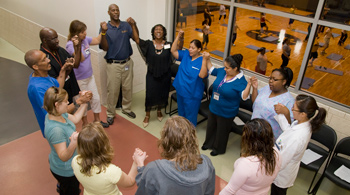Chicago’s Lawndale neighborhood is just five miles southwest of the Loop, the heart of downtown, where despite a bad economy, buildings continue to rise. Glass and steel glitter alongside Lake Michigan’s sparkling blue water. While the city’s skyscrapers are visible from Lawndale, the only things that glitter here are the bits of broken glass that line the curbs on the street.
In this neighborhood, Lawndale Christian Health Center shares the love of Jesus by providing health care services at a decent price. But this isn’t just a clinic in a poor neighborhood. The facility offers internal medicine care, obstetrics, family medicine, pediatric care and a pharmacy, as well as dental care, behavioral health services and substance abuse treatment. Across four locations in Lawndale and the surrounding neighborhoods, the health center received patients in nearly 250,000 visits in 2009.
The neighborhood’s needs are distinct, and Lawndale has tailored its services to those needs. And it continues to work to maintain its Christian mission and identity as it grows and matures as an organization.
“We could be an urgent care center and maybe we would see more people,” said Dr. Wayne Detmer, medical director of operations. “But Lawndale seeks to build relationships with its patients rather than churn through them. Especially in primary care, we need to focus on valuing relationships.”
Treating the whole person
For people living in poverty, even something as simple as making a doctor’s appointment can be difficult, Detmer said. Many other clinics nearby are so overcrowded that patients are not able to see a doctor when they are sick. Instead, they either get sicker or are sent to an emergency room.
“We try to set aside enough same-day appointments to accommodate those patients so that they may see their own medical providers,” Detmer said. Lawndale staff try to ensure that patients see the same medical providers each time they visit. “The relationship between the patient and her medical provider is an important one, and we make every effort to ensure that they end up together in the same exam room.”
So, in addition to seeing patients, Detmer focuses on making sure the patients’ experience with Lawndale staff and physicians is productive. It’s clear to patients that Lawndale is not a typical health care facility. The center’s tag line, “Loving God, Loving People,” is boldly written on the purple wall behind the front desk.
Phone operators work with patients to schedule appointments on the day the patients need them. Pharmacists help patients fill out the forms required by drug companies for free or low-cost pharmaceuticals.
During renovations in 2006, Lawndale redesigned the building, which had originally been a car dealership, to reduce the number of doors people needed to walk through. It had been a special challenge for women with little children and strollers to navigate the hallways. But the new floor plan was also simply more welcoming to people. Similarly, the center has installed additional windows and removed bars from others to communicate a sense of hospitality.
“It’s not just about the doctor and the patient,” Detmer said, “but from the greeters at the door on down.”
Lawndale has also made a significant investment in support staff. Social workers visit homes to address caregiving or environmental issues. For example, many neighborhood children have asthma and high lead levels. So Lawndale’s advocates work with landlords to cover up lead paint or remove old carpeting to rid homes of allergens.
These practices reflect Lawndale’s origins in Lawndale Community Church. Members of the church saw a need and created Lawndale Christian Health to address it.
“We were birthed out of Lawndale Community Church in the same way that a church births a choir,” said CEO Bruce Miller.
Growing in the community
Lawndale Christian Health Center now serves other neighborhoods with different demographics, some majority African-American and others majority Mexican, and as a result racial reconciliation is a larger piece of its work. New services require different skills from physicians and pharmacists.
A new site to be constructed two blocks from the main clinic will include a fitness center, expanded dental services and a coffee shop. The coffee shop reflects the fact that this health care center isn’t only interested in health care; it has a broader view of the neighborhood’s needs.
“Our mission isn’t just the exam table,” Miller said. “It’s employment; it’s giving people confidence.”
Miller wants to beautify the area. So in addition to adding windows and removing bars, he wants to add the coffee shop.
“We don’t have that right now because no businesses want to be in our neighborhood,” Miller said. “We’re going to change that.”
This commitment is why Lawndale has decided not to be an urgent care facility. The center is able to have the most impact in the lives of patients by caring for not just a part of the person but the whole person.
“That’s going to be better for the community,” Detmer said. “Let’s talk about dying well with an elderly person with cancer. How do we proceed, what social services are there for support?”
When offering advice in such a situation, Detmer said he has a certain perspective that is not necessarily supported at other health care institutions. “I believe that life is a gift and not just a product of time and chance. So life has meaning, and there is always hope.”
Staying on mission
Miller is sensitive to Lawndale’s history as the center grows. As the institution grows, Miller is keenly aware of other hospitals that no longer adhere to a religious identity. Some change in the mission and identity may make sense, but Miller seeks to sustain the institution’s core identity.
“That’s the fabric of the organization,” Miller said. “But we’re 25 years old.”
The health center began with two employees and now has 322. Lawndale’s $27 million in revenue in 2009 came mostly from payment for services, with about 20 percent from grants and other contributions. Economic stimulus funds will help pay for the fifth location, to be completed this year.
To sustain Lawndale’s mission and identity, Miller is focused on hiring the right people. In fact, he said nothing is more important to him than hiring correctly.
“How do you keep an organization on mission?” Miller said. “It’s all about people. It’s not something they consent to, but something they embrace.”
Hiring at religious institutions in the Chicago area has recently become a local controversy. World Relief, a Christian relief and development organization, was put on the front page of the Chicago Tribune after changing its hiring policy to allow only Christians. So Miller was cautious as he described Lawndale’s hiring policies and his responsibility to maintain the organization’s identity while legally filling its staffing needs.
But Detmer said, “We think in terms of Corinthians. The body is not one member but many.”
Each staff member has a part to play. Its emphasis on holistic care, including spiritual care, means that Lawndale’s staff must value relationships as well.
“You can’t train people on commitment to the mission,” Miller said. “It’s hard to standardize spiritual care. Interacting on a faith level -- there’s not a cookbook for that.”
Lawndale does what it can to reinforce its mission with practices such as holding all staff meetings and regular gatherings with Lawndale Community Church, where the health center was born. There are daily services of hymn singing and morning prayer.
At Lawndale, physicians are required to do more than care for patients physically. They must also care for them spiritually.
“I view every position as part chaplain,” Miller said. Every staff member must be willing and able to offer verbal prayer for patients. “We expect everyone to be holistic practitioners of their trade.”
Physicians offer to say a prayer for the patients they see. But just as doctors cannot force patients to be vaccinated, Miller said, Lawndale doesn’t force its faith on the community. Most patients, however, are eager to be prayed for.
That commitment also attracts others. “My favorite part of being here at Lawndale is the opportunity to work with the staff here, because of their sense of God’s call to share the love of Christ by providing quality health care,” Detmer said.
For Miller, the proof that Lawndale Christian Health Center is staying true to its mission and identity is not in the many and various statistics it tracks on patients, although a new electronic records system does allow Miller to constantly measure Lawndale against other health care providers in the city. And because of that, he’s satisfied that they are providing quality care at a reasonable cost.
“I love being an organization that goes about quietly doing its mission,” Miller said.
But the proof the institution is staying on mission is the feedback from patients. When they tell him they’ve never been to a health care facility like Lawndale and that there is something different about the staff, Miller knows that Lawndale is on track. Miller thinks about people like Jerry, who got off heroin through Lawndale Community Church, got a job at the Health Center, and bought a house through the Lawndale Development Corp.
“In the end,” Miller said, “changes come down to individually changed lives.”
Questions to consider
Questions to consider:
- How does the daily work of your institution embody its mission and history? How do you stay true to both over time?
- What features of your building communicate a sense of hospitality to the community you serve?
- What services could your institution offer to “treat the whole person”?












